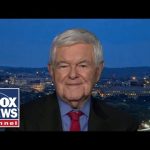The political stage is buzzing with news, as the White House gears up for a highly anticipated announcement regarding a major trade deal. President Trump, known for his flair for the dramatic, is teasing this revelation on social media, specifically stating that it will involve a “big and highly respected country.” While speculation runs rampant that the announcement pertains to the United Kingdom, the president has chosen to keep everyone guessing—at least for now. The conference is slated to kick off at 10:00 a.m. tomorrow, and the excitement is palpable.
In the backdrop of this trade deal excitement, the Trump administration continues to engage in discussions with China. However, some individuals hoping for a rollback of tariffs may find themselves disappointed. President Trump has firmly stated that he is not in favor of withdrawing tariffs just to lure China back to the negotiating table. Instead, he has made it clear that safety and security concerns must be addressed first, specifically the flow of fentanyl into the United States. It appears that past agreements made with Chinese President Xi are still fresh in Trump’s mind, as he recalls them fondly from his previous administration.
Meanwhile, trade talks are not the only matters on the agenda. The administration is also cautiously negotiating for a nuclear deal with Iran, aiming to reintegrate the country into the global economy. If successful, this could make things better for the Iranian people, but there is a catch. Iran’s nuclear ambitions remain a worry, and President Trump has suggested that a strong and verified deal could mean dismantling, or as he put it, “blowing up,” their nuclear facilities. This would prevent Iran from enriching uranium to dangerous levels while keeping global peace in check.
In a tactical move, part of the negotiations appears to involve renaming the Persian Gulf to the Arabian Gulf. This change, which does not sit well with Iran, is said to reflect the true preferences of the countries in the region. For many, the term “Arabian Gulf” is already in common use, and it sends a strong message to Iran about the expectations and power dynamics at play.
To top it all off, Vice President J.D. Vance has weighed in on the situation regarding Russia and potential ceasefire talks. Echoing the frustration of many, he expressed concern over what Russia is asking in negotiations, hinting that it is unrealistic. However, he also provided a glimmer of hope, suggesting that substantial economic incentives may lead to peace, which is what everyone desires—a sense of stability and the end of destruction in Ukraine.
As the nation prepares for the upcoming trade announcement and continues to watch diplomatic relations unfold, one thing is clear: the Trump administration is actively shaping the landscape of international relations. Whether these moves lead to success remains to be seen, but the fervor surrounding these developments is unmatched. Bullets might not yet be flying, but the political chess pieces are moving at a rapid pace. Let’s just hope they can checkmate the challenges without causing too much collateral damage!




